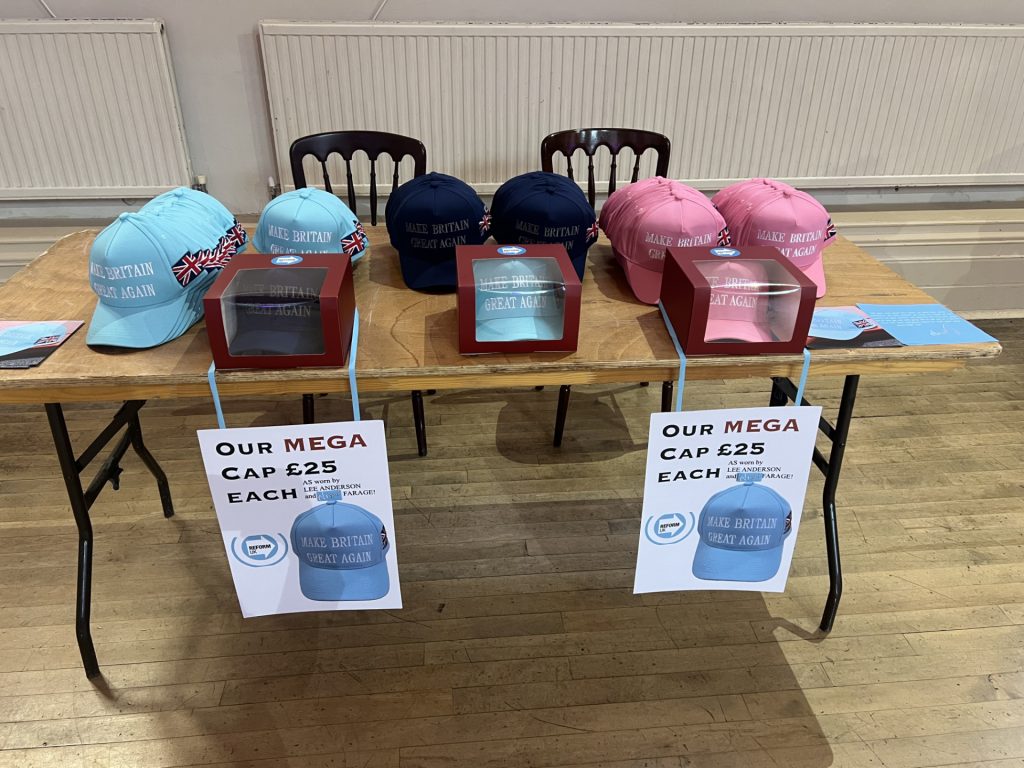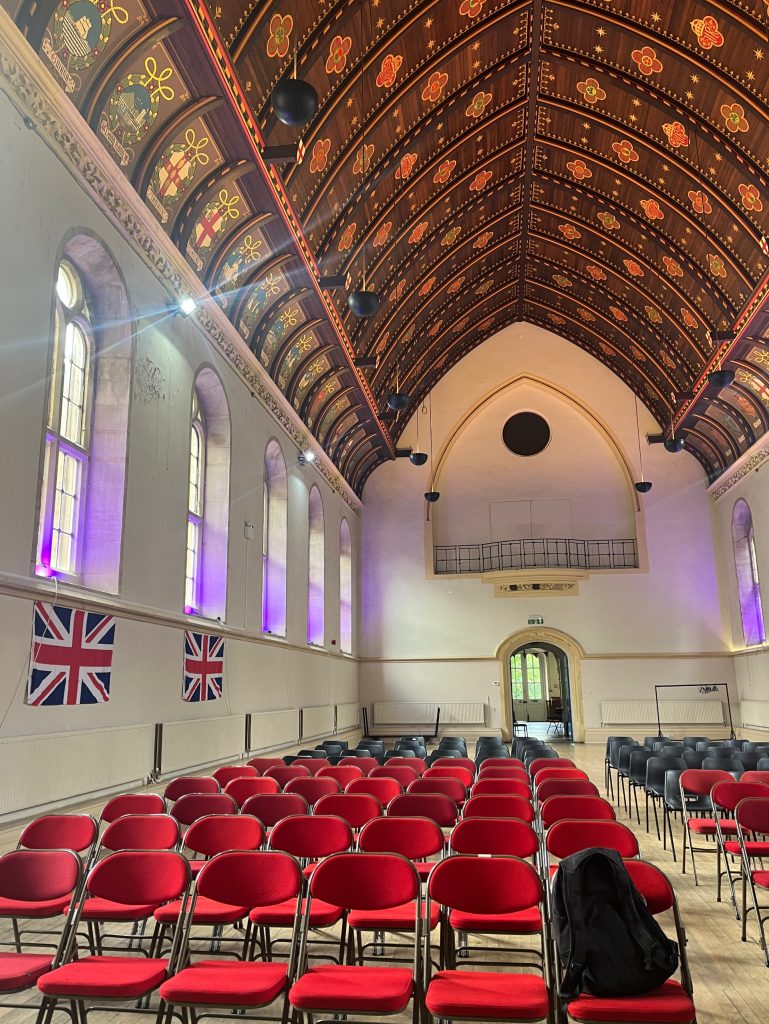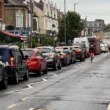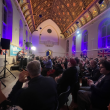Over 120 people gathered in the ornate Victorian hall of Le Gothique in Wandsworth last night as Reform UK had its first rally in Wandsworth, bringing Nigel Farage’s party to South West London for the first time as it lays the groundwork for a serious challenge in the 2026 council elections.
The venue itself told a story. Beneath a spectacular painted ceiling depicting heraldic crests and military scenes, rows of attendees faced a podium flanked by Union Jack bunting. The historic building, built by public subscription in 1857 for Crimean War veterans, is run by Councillor Mark Justin – a local Conservative who defected to Reform after being deselected by his former party. His presence hosting the event symbolised Reform’s strategy of attracting disaffected politicians from established parties.
At the back of the hall, a merchandise table displayed “Make Britain Great Again” caps in baby blue, navy and pink for £25 each – a visual reminder of Reform’s embrace of Trumpian political messaging and branding.

A recruitment drive with clear purpose
This was no mere rally – it was a sophisticated recruitment operation designed to convert Reform enthusiasm into actual candidates. Campaign manager Mitch opened with the maths: Reform has 26 candidates for Wandsworth’s 58 council seats, and so needs to more than double their roster. It was a message repeated by each speaker. The evening raised £1,200 – modest by political standards but significant for what Reform described as a “start-up” operation.
The recruitment pitch came from multiple angles. Justin offered personal testimony: getting into politics had been “the best three and a half years of my life.” He demystified the role – “Don’t worry about being on a council – officers will guide you. Your job is to dictate policy” – for an audience that had never been involved in politics before.
Westminster Councillor Laila Cunningham described how “as a councillor you can scrutinise the party in power” and become “a community leader” in ways that are impossible outside politics. The message was reinforced by speakers from Wales, Westminster and Wandsworth – Reform figures in power demonstrating the party’s growing reach.
The overarching narrative was familial and urgent. “If you care about your children’s future, and what your parents and grandparents did for this country, you need to get involved,” one speaker declared. Stuart Keyte, Reform’s first Welsh councillor, asked pointedly: “One day your children will come to you and ask: what did you do to save our country?”
Fighting for families and country
That was a familiar theme of the night: struggle and sacrifice. “We have to fight,” Keyte declared. “Fight for freedom, for free speech. Are you up for the fight?” The language of battle permeated the evening – speakers repeatedly returned to the theme of “fighting for your country,” “fighting for your families,” and “fighting for your community.”
“If we don’t win this fight,” speakers warned, the stakes were not just high but existential. This framing clearly resonated with an audience who cheered when asked who had “had enough” of the Conservatives, and cheered again when asked who thought “Labour is worse.”
Housing proved the evening’s most potent issue, with speakers’ criticism of current policies including legal battles over asylum hotels and media coverage of houses provided to those awaiting hearings drawing sustained applause. Immigration issues also resonated strongly.
However, some rhetoric received a notably muted response. Keyte’s dismissal of university education – smart people going in and coming out stupid – and his calls to “protect our women and children” fell flatter than his military-themed patriotic appeals, making it plain that Wandsworth is not Wales and some of Reform’s messaging may need calibrating.
Alex Wilson, Reform’s sole London Assembly member, delivered a more conventional political pitch focused on Mayor Sadiq Khan’s record. His promises to scrap ULEZ and Low Traffic Neighbourhoods “on Day One” and criticism of rising congestion played well, though his climate change skepticism received less enthusiasm.
But what was noticeable was that whenever uncertainty passed in the room, the speakers deftly reminded them of where all the political momentum lie: Reform now polls at 35% nationally, Wilson noted, and has grown from 80,000 to 240,000 members in just one year.

Political analysis: An effective recruitment tool
As a recruitment exercise, the evening proved effective. Despite challenging acoustics in a grand hall, the atmosphere crackled with energy. Attendees huddled in animated conversations, many expressing variations of a common refrain – that this was their first political meeting but they felt “something needed to be done” about the country’s direction.
The setting itself became part of the message. Though the meeting stretched on a little too far – over an hour of speeches with some attendees slipping out for the toilet toward the end -underneath the spectacular Victorian ceiling and speaking in a grand stone chamber, they could invoke “old England” while promising radical change.
The event revealed a party attempting to professionalise its grassroots operation while maintaining its insurgent appeal. The focus on local government represents a pragmatic recognition that council seats may be more achievable than parliamentary breakthroughs in areas like Wandsworth, while the emphasis on being “real people with real lives” rather than “career politicians” attempts to counter perceptions of opportunism.
The mixed reception to different messages hints at the challenge of building a broad coalition while maintaining ideological consistency. The audience demographic – mostly white, aged 30-80, drawn from across the borough – suggests Reform is attracting voters from beyond its traditional base who are drawn to its populist appeal.
With Labour holding a majority on Wandsworth Council, Reform faces an uphill battle to make significant gains. However, the party’s focus on local issues and recruitment of established politicians like Justin suggests a serious long-term strategy. The meeting’s success in turnout, fundraising, and generating enthusiasm among first-time political activists indicates genuine grassroots momentum – making Wandsworth a key test of whether Reform can translate national polling strength into local electoral success.









